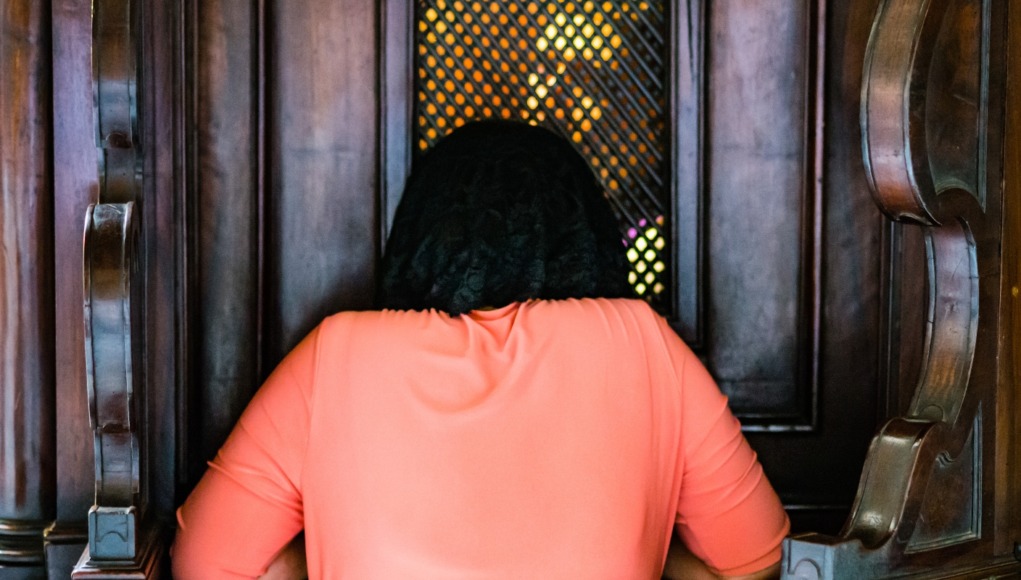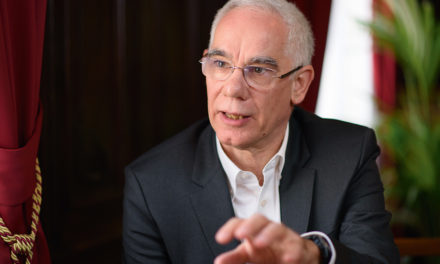It is important that we can end the year with a clear conscience. Everyone wants to be able to put down their burdens, leave their guilt behind, and start the next period with a clean slate. But how do we achieve this? According to the Catholic Church's answer, with confession. We asked Roman Catholic priest Róbert Rolik and psychologist Ágnes Barlay about the possibilities and limits of spiritual purification.
I went to confession a few months ago, and noticed the people waiting in front of me. Everyone behaved differently: some were crumpling a sheet of paper in their hands, some were standing motionless with their eyes closed, but felt that they were fighting a huge battle in their minds, and some were trembling all over. The people leaving the confessional, on the other hand, behaved similarly: they smiled with relief.
I wondered what kind of spiritual process takes place in us during confession? I then talked about this with our priest, Father Róbert, who approached the mystery of confession from the perspective of faith, and psychologist Ágnes Barlay, who approached it from a scientific perspective.
What is confession according to the teaching of the Church?
Róbert.: Confession is the sacrament of forgiveness, which we owe to Jesus. When he rose again and appeared to the apostles on Easter Sunday night, he said: “Receive the Holy Spirit! Whose sins you forgive, they are forgiven, but whose sins you do not, they remain in sin.” Jesus founded the sacrament of forgiveness with these words, showing the apostles why he actually came: to convey God's mercy and love.
How did we get from the founding words of Jesus to today's confessional formula?
Róbert: Confession has always been part of the sacraments of the Church, just in a different form. In the early church it was applied only to the greatest, public sinners. At that time, only apostasy, abortion and adultery were serious crimes. The sacrament of absolution was offered when someone had committed one of these three. However, in order to receive absolution, the person had to live a very serious life of penance. In later centuries, as more and more people joined the Church, aural confession, the form of confession we know today, was developed, where we can report all kinds of sins to our priests.
Many people are in such a way that they can repent of their sins themselves, they "settle" them directly with God. Why is it still necessary to tell or confess these embarrassing things to another person?
Róbert: It is always much easier for a person to deal with the difficulties, pains, and oppressive burdens in his heart and soul if he speaks them out. If that doesn't happen, we carry the weights - it's like going hiking with a stacked backpack full of rocks. Of course
how much easier it is to unload the stones and start the climb with a light, empty backpack!
In fact, saying bad things is important to the human psyche. Psychologists also help with this, and that is very good. In confession, on the other hand, something else happens: the priest plays a mediating role: he represents God, conveying His mercy and love. When I hear the words of absolution, it is a liberating force for me, the confessor, that I am forgiven. It is important that the confessor hears from the priest that "there is nothing wrong, I am not angry with you." These are the words of God.
Ágnes, is it psychologically better to confess our sins to another person?
Ágnes: You often hear that some people say: "I settle my sins with God, why should I tell the priest?" But if we say it, verbalize our sins, they become concrete in front of us. In this way, I not only "usually" know that I am guilty, like anyone else, but I can name my sins, which thus become "put away". This is not easy to do, but it is worth it.
Confession is based on knowing that we have done something wrong, because our conscience tells us. But what is conscience according to science?
Ágnes: In Freudian psychology, conscience appears as a super-ego, superego. Every healthy person has a conscience, through which we can know whether we are doing good or bad, whether we act or speak right or wrong.
Isn't confession meant to ease their conscience?
Ágnes: According to Butler, four reasons drive people to confess: relief from tension, the experience of acceptance and release, the cleansing of true guilt from false guilt, and the responsibility assumed for self-improvement. I think we can also add the desire for spiritual purity and the possibility of a fresh start.
What can give the feeling of infinite liberation after confession?
Ágnes.: According to CG Jung, the relief after confession can be attributed to the fact that one's moral isolation and seclusion ceases, and one feels free. It's really like putting down a heavy bag that we've been carrying for a long time. The knowledge that God has forgiven all our sins can fill us with endless great joy.
Can examination of conscience and confession also contribute to our healthy personality development?
Ágnes: In terms of self-knowledge and self-education, concrete knowledge of our bad qualities - and of course our good qualities - is important. We cannot get stuck at a certain level, we must constantly improve.
Preparing for confession helps our self-knowledge, confronts us with ourselves.
Confession is often accompanied by a sense of shame, but don't get it wrong, this is not the same as repentance, it is "just" guilt. Feelings of shame can also have a protective function: at the time of temptation, I can think that if I "let myself" be tempted and go into sin, then one day I will have to confess this, and I might be very ashamed of this. Therefore, I prefer to resist and not commit that sin.
And if shame keeps you away from confession?
Ágnes: A small degree of anxiety before confession is completely normal and acceptable, but if it is too great, it is worth dealing with it. Either by going to confession more often, we almost "get it" and it becomes a natural part of our spiritual life, or by thinking of the first two reasons according to Butler, that is, that we get rid of tension and live the experience of acceptance and release. All this is "worth" a little anxiety.
Feeling ashamed is also normal, especially if you confess to a priest you know. But that shouldn't hold us back.
The father confessor is present with an understanding and accepting attitude and represents God to us. Let us think that we confess to God. The feeling of liberation is often associated with a feeling of happiness, and this fills a person with joy. Of course, all this happens under the influence of grace, but that is already the domain of theology.
Father Róbert, how do you live as a priest when you go to confession?
Róbert: When you go to confession, I am also present as a person in need of forgiveness, since I am a sinner myself. I feel that I can be very empathetic in the confessional, because my own experiences also help me to look at confession with an understanding eye.
During confession, I feel that God is also present, because the Holy Spirit suggests things, say in my heart, that I could not have thought of on my own.
So I get help in the process to tell the confessor what the Lord is telling him. Then when I confess, I also experience God's love and mercy.
In what case can the priest refuse absolution?
Róbert: I am not there as a judge who passes judgment on another, but I represent God. I believe that the only thing that prevents absolution is if the confessor is not sincerely repentant, or even says that he does not want to change his way of life. Of course, he still came to the confessional for something, so somewhere he feels that he should deal with the matter.
Is there a situation when the priest is not bound by the secret of confession?
Róbert: No, it is binding in all cases. Even if it is the priest who gets in trouble because of it, even in connection with a crime.
If the criminal gives information during a confession, it should not be passed on either.
on the other hand, the confessor must be obliged to cooperate with the authorities, otherwise the confession has no meaning.
Can a person go to confession who doesn't even know how to do it, and in some cases, is not even a religious practitioner? Can you still get a release this way?
Róbert: It is not a confession, but a spiritual conversation, spiritual guidance. Those who have not received first communion and are not religious practitioners cannot receive this sacrament, but they can also participate in a spiritual conversation with the priest, which may even lead to spiritual healing for them.
What can we say to those who have never confessed but would like to ease their souls?
Róbert: Trust God with courage and share your own inner burdens with Him, either by praying or writing down your thoughts. And we must reconcile not only with God, but also with our fellow humans and ourselves. If I offend someone, it is not enough to settle it in confession and ask for God's forgiveness, but I have to go to the other person and tell them: "Forgive me, don't be angry with me." In the same way, it is very important to look at ourselves with compassionate eyes.













